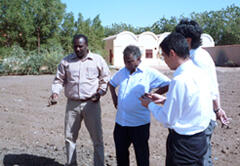Improvement of Food Security in Semi-arid Regions of Sudan through Management of Root Parasitic Weeds
Principal Investigator
ODA Recipient Country
The Republic of the Sudan
Research Institutions in Japan
Kobe University
Research Institutions in Counterpart Country
Sudan University of Science and Technology (SUST)
Adoption fiscal year
FY 2009
Research Period
5 Years
Overview of the Research Project
Parasitic plants cause enormous damage to crops in arid regions
Sudan has vast areas of potential cropland, but has been suffering from the devastating effects of the root parasitic weeds of the genus Striga, commonly known as witchweeds. The parasites are widespread in the arid and semiarid regions in Africa on economically important food crops, sapping them of nutrients and water and thus causing serious losses in grain yields. The aim of this project is to i ) identify novel compounds or microorganisms capable of modulating Striga germination, ii ) develop effective management strategies and iii) introduce crops resistance to the parasites.
Combining traditional knowledge and cutting edge technology to manage Striga
We, in collaboration with Sudanese scientists, are developing substances that induce self-destruction in Striga and conducting research on reducing damage by appropriate water management. We interviewed local inhabitants to acquire knowledge on traditional Striga and crop management practices. Farmers field schools have been initiated to transfer available Striga management technologies. We are aiming to boost and stabilize food production in Sudan, and eventually spread the developed technologies across sub-Saharan Africa.
Photo gallery
Research Project Web site
Press Release
Links
Projects
Contact Us
Japan Science and Technology Agency (JST)
Department of International Affairs
SATREPS Group
TEL : +81-3-5214-8085
Related articles by Category
- Bioresources
Bioresources

 Republic of Indonesia
Republic of Indonesia
Promoting the blue economy by utilizing seaweed resources!
Development of Sustainable Seaweed Based Functional Products for Promoting Blue Economy
- Sudan
Bioresources

 The Republic of the Sudan
The Republic of the Sudan
Contribute to resolving food shortages by developing heat-tolerant wheat
Development of Climate Change Resilient Innovative Technologies for Sustainable Wheat Production in the Dry and Heat Prone Agro-ecologies of Sudan and Sub-Saharan Africa
- Africa
Environment / Energy
(Global-scale environmental issues)
 Republic of Zambia
Republic of Zambia
Experienced, not taught - Realizing safe water, sanitation and hygiene in Africa
Risk-based Participatory WASH Planning and Citizen-data WASH Statistics for African Peri-urban Settlements
- SDGs : Goal.2
Bioresources

 Republic of Indonesia
Republic of Indonesia
Achieve sustainable vegetable production in tropical regions using advanced breeding technology!
Breeding Innovation in Chili Pepper and Tomato to Accelerate Sustainable Vegetable Production in Tropical Regions




















